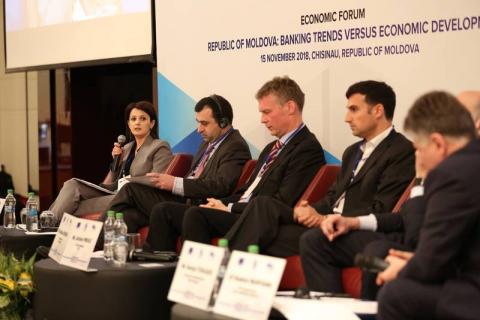
The Development Facility of the European Fund for Southeast Europe (EFSE) today joined forces with key sector players and other partners, including the Central Banks of Moldova, Armenia, and Georgia, to hold an Economic Forum in Chisinau. Top among the conference’s themes was the role of regulators and banks in supporting sustainable economic development and the advancement of local currency lending to micro and small enterprises (MSEs).
The forum, entitled ‘Republic of Moldova: Banking Trends versus Economic Developments’, attracted around 100 participants from the Moldovan financial sector as well as from business associations, policymaking bodies, international financial institutions, and local businesses. Held as part of the EU4Business initiative, the Economic Forum provided an interactive platform for exchange on trends in the Moldovan financial and real sectors. Topics ranged from the most effective way for banks to support long-term, dynamic economic growth, to opportunities and challenges in fostering an inclusive and sustainable business environment.
In keeping with EFSE’s mission to promote economic development and prosperity in the region, special attention was devoted to the role of local currency financing in supporting MSEs – an important segment of the country’s economy.
Local currency loans
Markus Aschendorf, Chair of the EFSE Development Facility, stated: “Enabling MSEs to take out loans in their own currency is key to safeguarding these businesses from the volatility of exchange rate fluctuations – developments that can pose a serious risk to a small enterprise’s liquidity and viability. Events like today’s Economic Forum allow key players in the financial sector in the European Neighborhood Region to learn from each other’s successes and experiences in the provision of local currency financing. The EFSE Development Facility was pleased to have such a facilitating role, bringing in the expertise of its strategic partners from Armenia and Georgia.”
“As the era of low interest rates and strong currencies across the emerging economies is unwinding, promoting lending in local currencies is critical for sustaining broad-based growth and financial stability. From the central bank perspective, increasing the use of local currency in financial intermediation also helps to improve the transmission mechanism. Moldova is closing a difficult chapter in its banking sector history. Our banks are emerging stronger and more resilient, and as modest but persistent growth takes hold, learning from the experience of our peers in promoting local currency lending with EFSE support is very timely and valuable,” said Vladimir Munteanu, the First Deputy Governor of the National Bank of Moldova.
About the EFSE Development Facility
The Development Facility of the European Fund for Southeast Europe was created in 2006 to support the fund’s development finance mandate. It deploys effective, targeted and innovative technical assistance to maximise the impact and extent of the fund’s development finance mandate in target countries. The services of the fund encompass capacity building and training, financial sector support, and applied research with the aim of strengthening the internal capacities and operations of the fund’s partner lending institutions.
